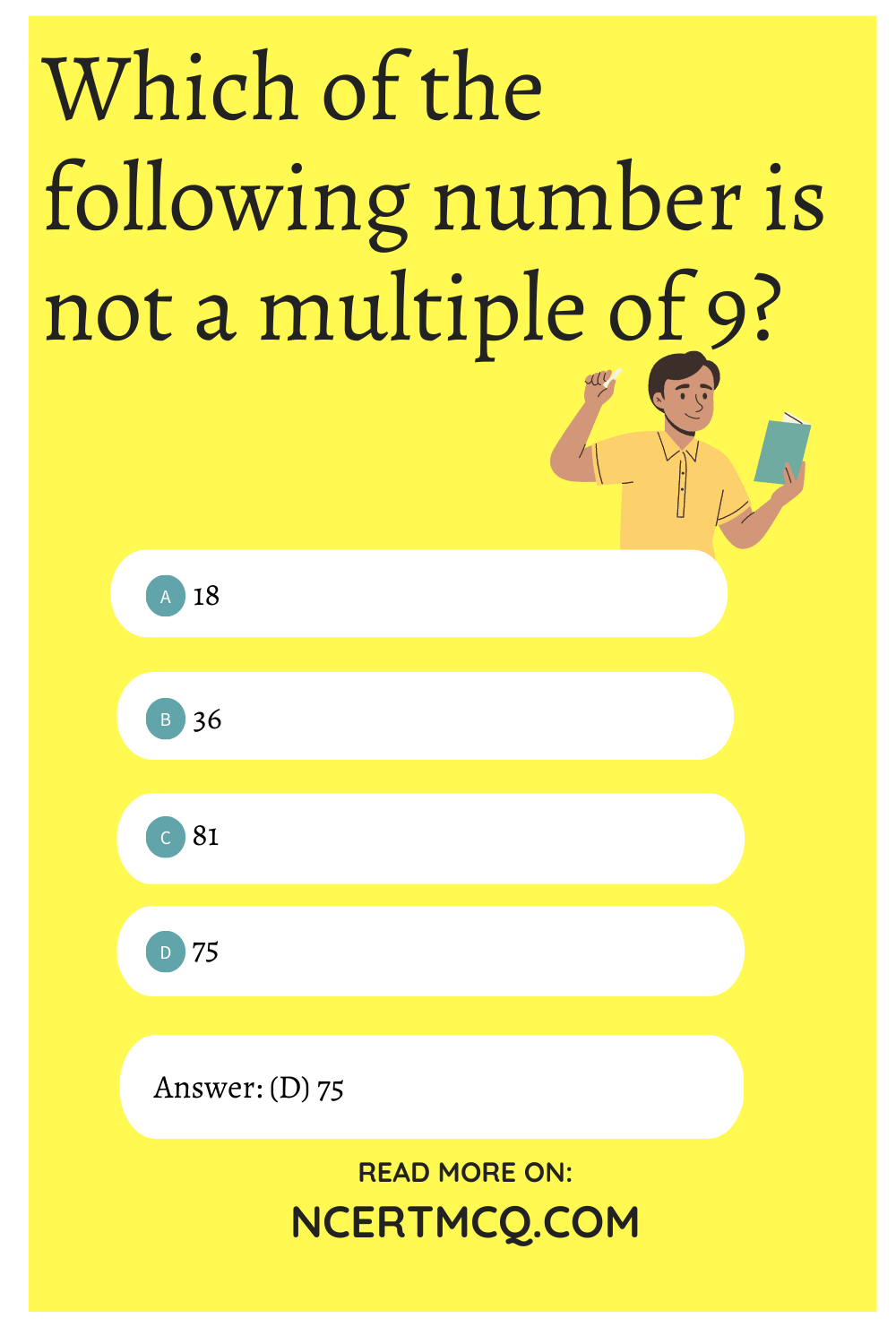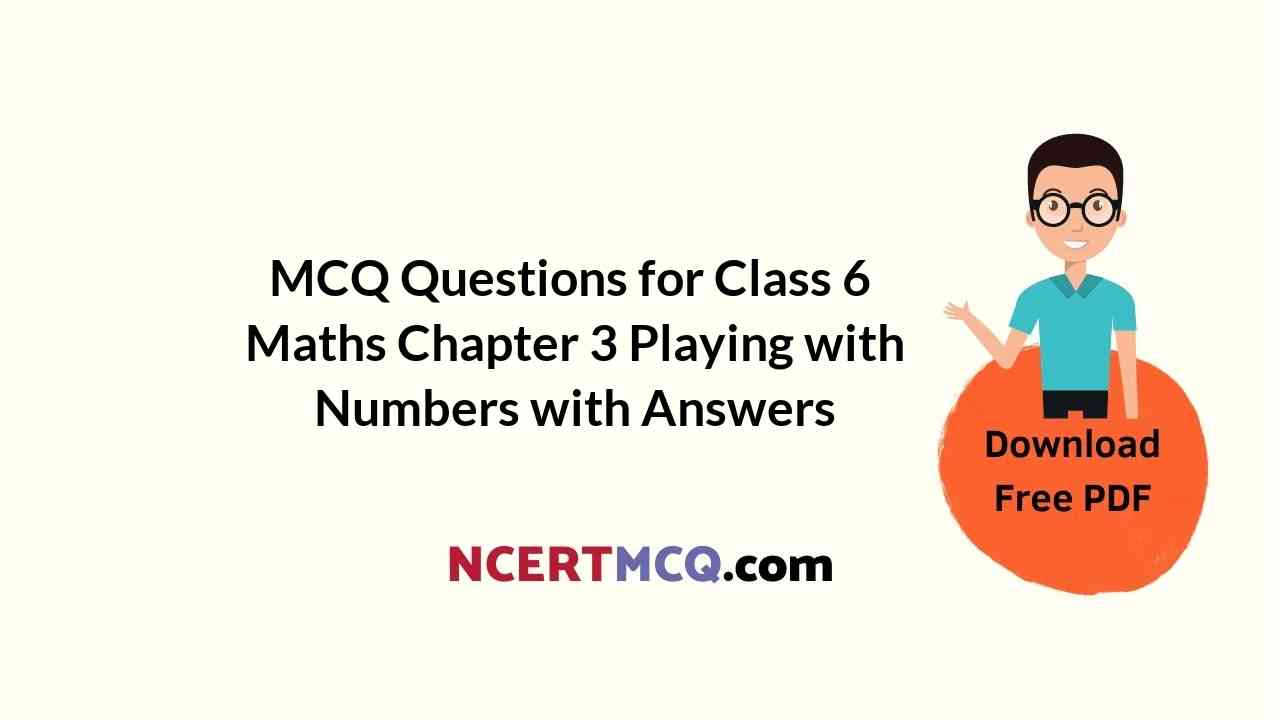Check the below NCERT MCQ Questions for Class 6 Maths Chapter 3 Playing with Numbers with Answers Pdf free download. MCQ Questions for Class 6 Maths with Answers were prepared based on the latest exam pattern. We have provided Playing with Numbers Class 6 Maths MCQs Questions with Answers to help students understand the concept very well.
Students can also refer to NCERT Solutions for Class 6 Maths Chapter 3 Playing with Numbers for better exam preparation and score more marks.
Playing with Numbers Class 6 MCQs Questions with Answers
Playing With Numbers Class 6 MCQ Question 1.
Which of the following numbers is not a factor of 68?
(a) 2
(b) 4
(c) 17
(d) 6.
Answer
Answer: (d)
Class 6 Maths Chapter 3 MCQ Question 2.
Which of tfie following numbers is not a factor of 36?
(a) 2
(b) 4
(c) 18
(d) 8.
Answer
Answer: (d)
MCQ Questions For Class 6 Maths Chapter 3 Question 3.
Which of the following numbers is not a factor of 24?
(a) 2
(b) 3
(c) 4
(d) 5.
Answer
Answer: (d)
MCQ On Playing With Numbers For Class 6 Question 4.
Which of the following numbers is not a factor of 15?
(a) 1
(b) 3
(c) 4
(d) 5.
Answer
Answer: (c)
MCQ Class 6 Maths Chapter 3 Question 5.
Which of the following number is not a factor of 21?
(a) 1
(b) 3
(c) 6
(d) 7.
Answer
Answer: (c)
Playing With Numbers MCQ Class 6 Question 6.
Which of the following number is not a multiple of 27?
(a) 1
(b) 3
(c) 9
(d) 6
Answer
Answer: (d)
Class 6 Playing With Numbers MCQ Question 7.
Which of the following numbers is not a factor of 12?
(a) 4
(b) 2
(c) 3
(d) 8.
Answer
Answer: (d)
MCQ On Playing With Numbers Question 8.
Which of the following numbers is not a factor of 20?
(a) 2
(b) 4
(c) 5
(d) 6.
Answer
Answer: (d)
MCQ Playing With Numbers Class 6 Question 9.
Which of the following number is not a factor of 18?
(a) 2
(b) 3
(c) 6
(d) 8.
Answer
Answer: (d)
Playing With Numbers MCQ Question 10.
Which of the following number is not a multiple of 6?
(a) 12
(b) 21
(c) 24
(d) 36.
Answer
Answer: (b)
Class 6 Maths MCQ Chapter 3 Question 11.
Which of the following number is not a multiple of 5?
(a) 15
(b) 20
(c) 30
(d) 33.
Answer
Answer: (d)
MCQ For Class 6 Maths Chapter 3 Question 12.
Which of the following number is not a multiple of 9?
(a) 18
(b) 36
(c) 81
(d) 75
Answer
Answer: (d)

MCQ Questions On Playing With Numbers For Class 6 Question 13.
The smallest prime number is
(a) 1
(b) 2
(c) 3
(d) 4.
Answer
Answer: (b)
MCQ Of Playing With Numbers Class 6 Question 14.
The smallest composite number is
(a) 1
(b) 2
(c) 3
(d) 4.
Answer
Answer: (d)
Class 6 Math Chapter 3 MCQ Question 15.
The prime number which is even, is
(a) 2
(b) 3,
(c) 5
(d) 13.
Answer
Answer: (a)
Question 16.
1 is
(a) a prime number
(b) a composite number
(c) neither prime nor composite
(d) an even number.
Answer
Answer: (c)
Question 17.
The smallest odd number is
(a) 1
(b) 2
(c) 3
(d) 4.
Answer
Answer: (a)
Question 18.
The smallest even number is
(a) 1
(b) 2
(c) 3
(d) 4.
Answer
Answer: (b)
Question 19.
The least prime number between 1 and 10 is
(a) 2
(b) 5
(c) 3
(d) 7.
Answer
Answer: (a)
Question 20.
The greatest prime number between 1 and 10 is
(a) 7
(b) 5
(c) 3
(d) 2.
Answer
Answer: (a)
Question 21.
Which of the following numbers is prime?
(a) 21
(b) 12
(c) 17
(d) 39.
Answer
Answer: (c)
Question 22.
Which of the following numbers is composite?
(a) 19
(b) 23
(c) 6
(d) 29.
Answer
Answer: (c)
Question 23.
Which of the following statements is true?
(a) The product of two even numbers is always even.
(b) The sum of three odd numbers is even.
(c) All prime numbers are odd.
(d) Prime numbers do not have any factors.
Answer
Answer: (a)
Question 24.
Which of the following statements is false?
(a) All even numbers are composite numbers.
(b) If an even number is divided by 2, the quotient may be odd or even.
(c) The sum of two odd numbers and one even number is even.
(d) Sum of two prime numbers is not always even.
Answer
Answer: (a)
Question 25.
128 is divisible by
(a) 2
(b) 3
(c) 5
(d) 10.
Answer
Answer: (a)
Question 26.
275 is divisible by
(a) 5
(b) 3
(c) 6
(d) 8.
Answer
Answer: (a)
Question 27.
116 is divisible by
(a) 2
(b) 3
(c) 6
(d) 8.
Answer
Answer: (a)
Question 28.
200 is divisible by
(a) 8
(b) 3
(c) 6
(d) 11.
Answer
Answer: (a)
Question 29.
1331 is divisible by
(a) 11
(b) 2
(c) 3
(d) 5.
Answer
Answer: (a)
Question 30.
1000 is divisible by
(a) 10
(b) 6
(c) 3
(d) 11.
Answer
Answer: (a)
Question 31.
The greatest common factor of 8 and 20 is
(a) 2
(b) 1
(c) 4
(d) 8.
Answer
Answer: (c)
Question 32.
The common factor of 9 and 15 is
(a) 3
(b) 6
(c) 9
(d) 15.
Answer
Answer: (a)
Question 33.
The common factor of 4 and 15 is
(a) 1
(b) 2
(c) 3
(d) 5.
Answer
Answer: (a)
Question 34.
Which of the following pairs of number are not co-prime?
(a) 7,15
(b) 12,49
(c) 18,23
(d) 12,21.
Answer
Answer: (d)
Question 35.
Which of the following pairs of number are co-prime?
(a) 30,415
(b) 17, 68
(c) 16, 81
(d) 15, 100.
Answer
Answer: (c)
Question 36.
The greatest common factor of 4, 8 and 12 is
(a) 2
(b) 1
(c) 4
(d) 8
Answer
Answer: (c)
Question 37.
The greatest common factor of 5, 15 and 25 is
(a) 1
(b) 5
(c) 10
(d) 15.
Answer
Answer: (b)
Question 38.
The common factor of 3, 4 and 9 is
(a) 1
(b) 3
(c) 4
(d) 2.
Answer
Answer: (a)
Question 39.
The greatest common factor of 75,60 and 210 is
(a) 1
(b) 3
(c) 5
(d) 15.
Answer
Answer: (d)
Question 40.
The smallest common factor of 4, 12 and 16 is
(a) 1
(b) 2
(c) 4
(d) 8.
Answer
Answer: (a)
Question 41.
The HCF of 8 and 12 is
(a) 1
(b) 2
(c) 3
(d) 4.
Answer
Answer: (d)
Question 42.
The HCF of 24 and 36 is
(a) 3
(b) 6
(c) 12
(d) 24.
Answer
Answer: (c)
Question 43.
The HCF of 27 and 63 is
(a) 3
(b) 6
(c) 9
(d) 18.
Answer
Answer: (c)
Question 44.
The HCF of 36 and 84 is
(a) 3
(b) 4
(c) 6
(d) 12.
Answer
Answer: (d)
Question 45.
The HCF of 30 and 42 is
(a) 2
(b) 3
(c) 5
(d) 6.
Answer
Answer: (d)

Question 46.
The LCM of 5 and 20 is
(a) 5
(b) 10
(c) 15
(d) 20.
Answer
Answer: (d)
Question 47.
The LCM of 6 and 18 is
(a) 6
(b) 12
(c) 18
(d) 36.
Answer
Answer: (c)
Question 48.
The LCM of 12 and 48 is
(a) 6
(b) 12
(c) 24
(d) 48.
Answer
Answer: (d)
Question 49.
The LCM of 9 and 45 is
(a) 3
(b) 9
(c) 5
(d) 45.
Answer
Answer: (d)
Question 50.
The LCM of 5 and 6 is
(a) 10
(b) 20
(c) 30
(d) 60.
Answer
Answer: (c)
We hope the given NCERT MCQ Questions for Class 6 Maths Chapter 3 Playing with Numbers with Answers Pdf free download will help you. If you have any queries regarding Playing with Numbers CBSE Class 6 Maths MCQs Multiple Choice Questions with Answers, drop a comment below and we will get back to you soon.
